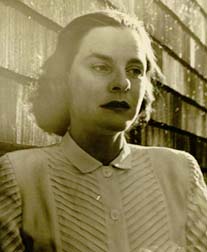
In 1982, for the 24 year old me, McCarthy’s feminism was a
truth waiting to be told, and, having despaired at the deadly corpus of Lit. Crit. on her, I thought I might play some part in announcing the discovery. I didn’t know it at the time, but it
turned out I wasn’t alone in this view: McCarthy’s one-time
editor on Partisan Review, William Barrett, had
reached a similar conclusion. In his memoir of the New York radical scene of the 1930s and 40s, The Truants, published in 1982,
Barrett wrote of ‘The Company She Keeps’: “We did not know it then, but she was
in fact firing the first salvo in the feminist war that now rages within our
society, though I doubt the movement has since produced any weapon of equal
class and calibre. It was also something of a shocking book, or seemed so at
the time.”
But the
trouble with seeing McCarthy as a feminist was that she really wasn’t having
any of it. In fact, she had expressed an intense dislike for feminism,
or so it seemed from a succession of fairly unequivocal public statements:
“A woman can’t possibly have all the prerogatives of
being a woman and the privileges of being a man at the same time….I much prefer
being a woman, probably for very bad reasons like liking clothes and so on.” Vogue
1963.
“As for Women’s Lib, it bores me….this whole myth
about how different the world would have been if it had been female
dominated…seems a complete fantasy to me.” Miriam Gross, The Observer 1979.
“I’ve always liked being a woman. And it seems to me
that one of the problems of a lot of feminists is they don’t like being women.”
Carol Brightman, The Nation 1984
To be fair, McCarthy had also voiced admiration for
a number of feminist writers and causes, yet, at the same time, it was obvious
that she held a deep dislike for radical feminism and was invariably at pains
to distance herself from ‘woman’s lib’.


Never read her, but will be searching her out. For too many women, even today, feminism is a dirty word.
ReplyDelete